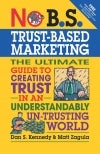Past Your Converted Adsense Code

In their book "No B.S. Trust-Based Marketing,"
authors Dan S. Kennedy and Matt Zagula detail strategies to build and
maintain trust in your business, and in turn attract both customers and
profits. In this edited excerpt, the authors explain how gaining
customers through trust builds long-term equity, earnings potential and,
ultimately, wealth.
I've deliberately worked at creating what I call "lifers" -- customers who stay engaged with me for decades, continuing to buy whatever I next bring forward, so that the getting of one in the first place is not just consummation of a transaction, but the start of a permanent relationship. In order to do this in my particular business -- essentially the dispensing-of-advice business -- I knew I had to earn and keep trust. I figured out that the three key factors in trust-based equity are, being known as a candid, blunt teller of truth; establishing constant, evident principles in all my works; and never abusing my customers for short-term profit.
My customers can trust that I won't endorse anyone or anything or sell them anything that I don't genuinely believe is honest, beneficial and the best in its category. For me, this has worked out very nicely. Many clients have been with me for 10, 20, 30, even approaching 40 years. And this translated to equity, as the company has been twice sold, providing a good share of my wealth. This asset can be built upon and leveraged into ever-growing wealth, or it can be destroyed, depending on the thinking and actions of the people who have stewardship of it.
My favorite company of all is Disney. In industries that were entirely transactional -- amusement parks, films, toys -- Walt Disney built trust-based brand equity and relationship equity. Relationship equity is still a major part of Disney's business today, driving premium-priced attractions, time-share real estate and very frequent repeat purchasing. A series of CEOs that have held stewardship of Walt's legacy have, amazingly, resisted almost all temptations to undermine the trust that the company's fans, customers, the public and even investors have for Disney.
Donald Trump has done something no other real estate developer and magnate has ever done: built a publicly recognized brand that adds price elasticity to every building and real estate project that bears his name, and, most recently, to product licensing and a successful TV franchise. Real estate buyers trust Trump to provide "the best." Consumers who aren't about to buy a $3 million penthouse apartment buy a Trump necktie or splurge for a stay at a Trump hotel or resort.
Related: 3 Ways to Build Consumer Trust
Income tends to be spent. Equity accumulates and converts to wealth. So everybody needs to be thinking about equity, early, and it is my contention that the only real equity is a quality relationship with committed, continuing customers. So I would suggest that anybody in any business ask themselves: What are the key factors that will make me such a trusted and relied on presence in my customers' lives that they stay and spend with me for life?
Don't reject the question because you think your business doesn't automatically lend itself to such a relationship.
If you own hardware stores or other retail stores or restaurants, why can't you become a trusted and significant part of your customers' lives? To many, Martha Stewart has made herself just that, and she dispenses much the same sort of ideas, information, and inspiration it would be appropriate for a hardware store owner to dispense. If you are a physician, chiropractor, a dentist, look at Dr. Oz. Whatever your business, there is a way to be found and figured out, to elevate your status and cement your importance to your clientele.
There are profound links between trust and relationship, relationship and equity, equity and wealth. Brand-name, over-the-counter remedies -- the brands we grew up with -- continue to substantially outsell generic versions of the same formulations and products displayed right next to them, and selling for up to 50 percent less. Why? Because Bayer is a trusted name. The 50 percent price and profit differential, from which much wealth can be derived, has nothing to do with product ingredients, product superiority, distribution or service, and everything to do with trust.
Related: 5 Ways to Set a New Company Up for Success
For most, trust is more complex than just a recognized brand name, and few of us have the resources or patience to wait to harvest future fortunes from such slowly accumulated trust. We need a more complex approach that can accelerate the achievement of high trust. A seismic shift begins with a change in the fundamental question of advertising, marketing and selling -- from how can I make a sale and money today, to how can I make sales and money today but also create trust today?










0 comments:
Post a Comment